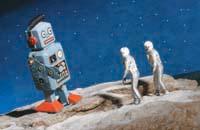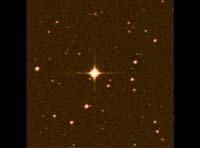In search of aliens in vain
2008/04/26 Galarraga Aiestaran, Ana - Elhuyar Zientzia

Why wouldn't there be life on planets like ours? And why not intelligent living? To some extent it is a logical question, so the search programs for aliens living have been reinforced. However, according to an article recently published in the scientific journal Astrobiology, they do not seem to reach the goal.
The article belongs to the British researcher Andrew Watson, of the University of East Anglia, and affirms that the possibility of creating intelligent life on a planet similar to that of the Earth is very small, specifically less than 0.01%.
In fact, it is debatable whether intelligent life on one of every 10,000 planets is small or large, with so many planets in the universe. However, researcher Watson has no doubt, he believes it is not worth looking for intelligent aliens. Of course, in the article it is explained that the main reason why intelligent living beings do not remain is the time necessary for, since living beings are created, intelligent beings appear. Somehow, as the time it takes to produce this evolution is very difficult to occur in the time when a planet can live. In fact, on planets like Earth, it estimates that the period of time that can generate and last life is 4-5 billion years.
But it is not just a matter of time. In addition, to explain an intelligent being since the creation of the first cell, we should take four consecutive steps of evolution. These four steps or milestones, according to Watson, are the creation of a unicellular bacterium, the creation of complex cells, the appearance of specialized cells in the bosom of complex living beings and, finally, the creation of intelligent beings who own a language.
Watson has created a mathematical model to see the possibility that this sequence will occur on a planet like Earth, and the result is certainly disappointing to alien seekers: in four billion years, the probability that it will occur is less than 0.01%.
According to Watson, the possibility of creating a being like a bacterium is much greater, but it is totally wrong to think that with time and evolution an intelligent being will be created. This has happened on Earth, so it is not impossible for it to occur, but on another planet it is very possible that the result is very different. And it is that, although some believe the opposite, evolution does not make sense.
Several results

In any case, we do not know if the alien seekers will take into account Watson's mathematical model, or if they will attend astrophysicist Frank Drake. In the 1960s, Drake created an equation to calculate the number of extraterrestrial civilizations capable of communicating with us, with which some obtain hopeful results.
The equation comprises the following factors: The number of stars created annually in the Milky Way, the percentage of stars that surround the planets, the proper orbit for the life of a few of those planets, the number of times that life arises, the number of times that the intelligent life has developed in which it has occurred, and how many of them have developed technology and desire to communicate.
The equation is full of unknowns and the result varies greatly depending on the value given to each factor, but in some scientific article, only in the Milky Way there are ten civilizations of this type. Reading this, more than one will wonder why they have not contacted us so far. Stephen Hawking responded very well to this question: “How do you want to have relationship with humanity?”
The question allows to create both jokes and remote hypotheses, but they are not scientists who are taken seriously little. And some of them, at least, do not seem to have been very affected by Watson's calculations, since they do not intend to abandon the alien life search projects.
Published in Gara

Gai honi buruzko eduki gehiago
Elhuyarrek garatutako teknologia




